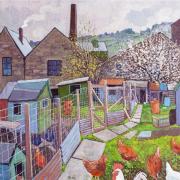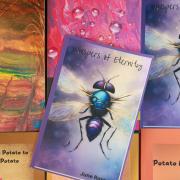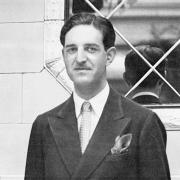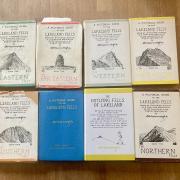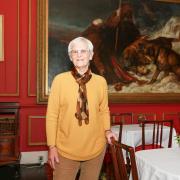Aliens who landed on our television screens took off from a converted barn at Westby

A steady stream of powerful professionals from the worlds of television, computer games and car manufacturers have made their way to a converted farm in the quiet village of Westby, near Lytham.
The village is home to Realtime, one of one of the most successful computer-generated image studios in the country. Launched in 1996 by Tony Prosser, who had recently graduated from Blackpool and Fylde college with a degree in Technical Illustration, it now has an annual turnover of £4.2million but back then a shock awaited Tony.
‘I wanted to create computer generated images but I soon discovered that the field was so new, there were no jobs. So, with the chutzpah of youth, I roped in two fellow graduates, borrowed enough money from my mum to buy three Apple computers and prepared to knock on doors,’ explains Tony whose initial interest in CGI was sparked by his love of Star Wars films, even though there is only one computer-based visual effect in the first three movies of the series.
‘We knocked on many doors but most of them stayed shut until we got a lucky break, making CGI to promote a mobile phone. We did it for free, just for the chance to showcase our talents. We were really pleased with our work but when we brought it back to the client, they told us the job was cancelled.

‘We persuaded them to look at what we had done anyway and it was a good thing we did because they ended up giving us a hugely prestigious job for McLaren Racing Cars,’ adds Tony, who produced photographic quality CGI, demonstrating how the cars would look when their livery changed from red and white to black and silver.
There was no looking back and Realtime is now the go-to studio when a car manufacturer wants CGI to demonstrate how a car will look before it makes it to the production line.
‘We deal with everyone from VW and Skoda to supercars like McLaren and Lotus. High value clients might want to personalise a car: colour, interior, as well as details such as a coat of arms on the headrest or a child’s name on the sill. They want to see what it looks like before the car is manufactured. It’s not an unreasonable request when the car’s finished price tag might be well north of a million pounds and our high-end photo realistic CGI makes that possible.’
Recently, Tony and the team have supplied CGI for the Rimac C _Two Configurator, a fully electric hyper car with 1900 bhp, that will cost £2million.

‘We produced CGI of a sci-fi type launch film for the car and can again show personal details for prospective purchasers. It’s a pretty big responsibility when someone will write a massive cheque because they like the image of the car,’ says Tony who points out that those who buy these super cars often buy fleets of different cars all manufactured to the same specification, so every detail is important.
Realtime have also made similar films for the defence industry, showing submarines, tanks and aircraft.
‘It was like James Bond with high level secrecy and security checks but we were later allowed to make a showreel out of some of the footage to show computer games developers. They loved it and now we make trailers for video games like ‘Sea of Thieves’. They’re usually released on YouTube and can cost anything from £200,000 to a million to make, even though they may only be three minutes long,’ says Tony, who was delighted to be asked to make a stunning trailer PC browser game for, ‘Game of Thrones: Winter is Coming’.
Tony and his team also create visual effects CGI for television, including ‘Mummies Alive’, a six parter for UKTV and The History Channel. They created realistic humans and sequences to show six different periods in history and they are currently working on top secret sci-fi/fantasy series for both BBC America and Sky.

However, it was the recent BBC production of War of the Worlds which placed Realtime centre stage and got everyone talking about the amazing tripod spaceships and Martians.
‘It’s not everyday that you’re asked to produce computer generated Martians,’ Tony adds. ‘They’re often portrayed with metal sheets bolted together but with high end CGI, there is so much more freedom for the imagination. They had a sort of whale skin, which could squash and stretch and add a bit of vulnerability - if you can call a Martian vulnerable - with realistic movements, able to hunt, creep and pounce.
‘It is all about sitting down with the client, discovering their vision and delivering it in order to serve the story.
It’s really crafting belief,’ says Tony who didn’t see the finished programme until he was in a cinema with other industry professionals.
‘I held my breath until I felt them jump when the Martians appeared - not that I jump any more at special effects - I’m too busy looking to see how they’ve done it!’ Six years ago, Tony opened a Manchester office which has recently doubled in size and over the next two years he will expand his work force to 100.
‘Some employees prefer to work in the city and Manchester is convenient for clients who fly in from America and China, although several love to visit the Lancashire countryside too,’ says Tony who has plans to convert farm buildings into studios and a motion capture green screen, as well as accommodation for freelance digital artists who may have travelled thousands of miles to work on a particular project.
It might not be long before Westby has its own Hollywood style sign.




